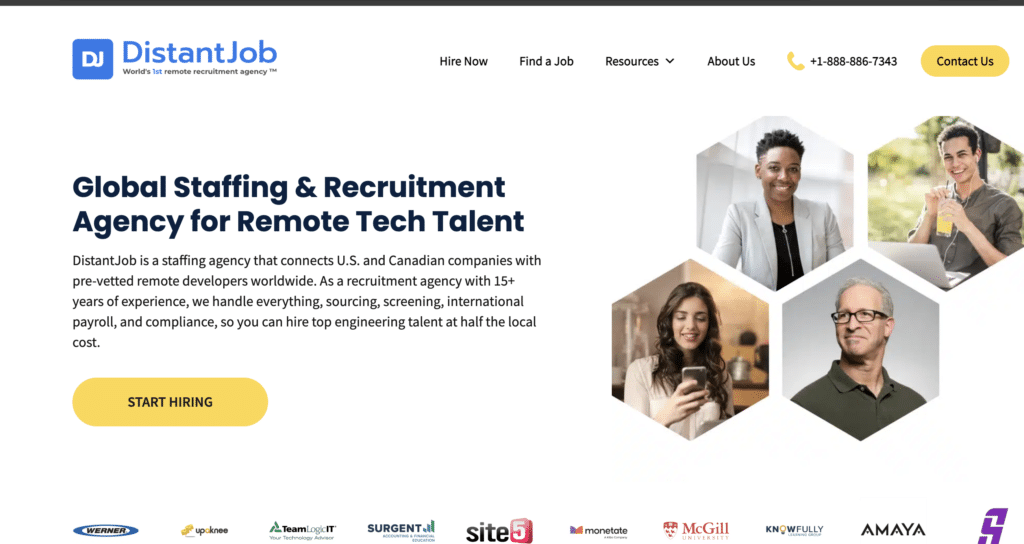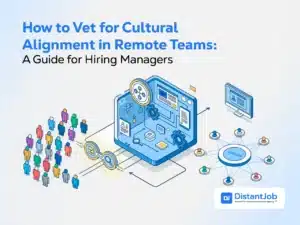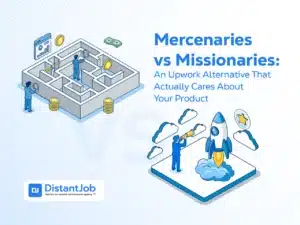Looking to hire remote developers but overwhelmed by endless platform options? I get it. After 15+ years of running DistantJob and personally overseeing hundreds of successful tech hires for North American companies, I’ve tested several online hiring platforms, and trust me, not all are created equal.
While everyone claims to have “top talent,” only a handful of platforms consistently deliver high-caliber developers who are an exact fit.
The best sites to hire remote developers in 2026 are staffing and recruitment agencies like DistantJob for full-time hires, vetted talent marketplaces like Toptal and Arc for premium short-term engagements, freelance platforms like Upwork and Fiverr for project-based work, and developer-focused job boards like We Work Remotely and Wellfound for direct sourcing. Each model serves a different hiring need, and picking the wrong one is the most expensive mistake companies make.
This guide isn’t a repackaged listicle. It’s a practitioner’s playbook built from real hiring outcomes, real costs, and real failures, so you can skip the expensive trial-and-error.
By the end, you’ll know exactly which platforms fit your timeline, budget, team structure, and risk tolerance, and which to avoid for your specific situation.
Quick List- Top 12 Sites to Hire Remote Developers in 2026
The best platforms for hiring remote developers in 2026 are:
- DistantJob — Remote recruitment and staffing agency specializing in full-time, pre-vetted developers from Latin America and Eastern Europe. Best for long-term hires with payroll, compliance, and ongoing support included.
- Toptal — Elite freelance marketplace claiming the “top 3%” of global talent. Best for high-budget, short-term premium engagements.
- Arc — AI-powered vetted marketplace matching companies with the top 2% of remote developers. Best for fast, quality-focused contract staffing.
- Upwork — The world’s largest open freelance marketplace. Best for short-term projects, MVPs, and prototyping across all budget levels.
- Lemon.io — Pre-vetted freelance developers with 24-hour matching. Best for startups and SMBs wanting affordable, quality-checked talent.
- Turing — AI-driven platform for sourcing and vetting remote engineers at scale. Best for companies needing multiple developers quickly.
- We Work Remotely — High-traffic remote job board with 6M+ monthly visitors. Best for companies with internal recruiting capacity.
- Fiverr — Gig-based marketplace for quick coding tasks and micro-projects. Best for bug fixes, small scripts, and one-off tasks.
- Hired — AI-powered platform with salary transparency and pre-screened candidates. Best for permanent and contract roles in the US and EU.
- Freelancer.com — Global open marketplace with competitive bidding. Best for price-sensitive projects and prototyping.
- Wellfound (AngelList Talent) — Startup-focused job board connecting founders with developers. Best for venture-backed companies building engineering teams.
- GitHub Jobs — Developer community with visible code portfolios. Best for companies with strong technical teams that can evaluate code directly.
Comparison Table: All Platforms Side by Side
Use this table to quickly compare cost, vetting rigor, ideal use case, and hiring speed across all 12 platforms.
| Platform | Type | Cost Range | Vetting Level | Best For | Time to Hire | Developer Regions |
|---|---|---|---|---|---|---|
| DistantJob | Recruitment Agency | $2,000–$7,000/mo salary | Rigorous (technical + cultural) | Full-time, long-term hires | 2–3 weeks | Global |
| Toptal | Vetted Marketplace | $60–$180/hr | Elite (Top 3%) | Premium short-term projects | 1–2 weeks | Global |
| Arc | Vetted Marketplace | $50–$120/hr | Top 2%, AI-matched | Fast contract staffing | 2–5 days | Global |
| Upwork | Open Marketplace | $20–$150/hr | Self-reported + reviews | Short-term, MVPs, prototyping | Instant–3 days | Worldwide |
| Lemon.io | Vetted Marketplace | $35–$80/hr | Multi-step screening | Startups, SMBs | 24–48 hours | Eastern Europe, LATAM |
| Turing | AI Staffing Platform | $40–$120/hr | AI + human vetting | Scaling engineering teams | 3–5 days | Global |
| We Work Remotely | Job Board | $299/post | None (your screening) | Direct sourcing, full-time | 1–4 weeks | Worldwide |
| Fiverr | Gig Marketplace | $5–$150/hr | Seller ratings only | Bug fixes, micro-tasks | Instant | Worldwide |
| Hired | AI-Matched Platform | $50–$140/hr | Pre-screened, AI-matched | Permanent/contract hires | 1–2 weeks | US, EU |
| Freelancer.com | Open Marketplace | $10–$120/hr | Basic reviews | Budget projects, contests | Instant–3 days | Worldwide |
| Wellfound | Startup Job Board | Varies | None (employer screening) | Startup engineering hires | 1–4 weeks | US, India, Global |
| GitHub Jobs | Developer Community | Varies | Code portfolio review | Technical evaluations | 2–4 weeks |
Detailed Platform Reviews
1. DistantJob: Recruitment & Staffing Agency for Full-Time Developers

What it is: DistantJob is a specialized staffing & recruitment agency founded in 2008 that places pre-vetted, full-time developers with North American companies. Unlike marketplaces where you browse profiles, DistantJob handles the entire hiring process end-to-end: sourcing, technical assessment, cultural fit evaluation, payroll, legal compliance, and ongoing HR support. The developers work exclusively for you as full team members, not as shared freelancers.
How vetting works: Every candidate goes through a multi-stage process: technical skills assessment tailored to your stack, English proficiency evaluation, cultural fit interview aligned with your company values, and reference checks. DistantJob’s recruiters specialize exclusively in tech roles, so they understand the difference between a developer who knows React and one who can architect a React application at scale.
Pricing: No upfront fees. You pay upon successful placement. DistantJob handles payroll, benefits, and local compliance, there are no hidden costs for international employment infrastructure.
Ideal for: Companies that need a full-time, dedicated developer who integrates into their existing team as a long-term hire. Especially valuable for North American companies wanting to access Latin American and Eastern European talent pools without navigating international employment law themselves.
Developer regions: worldwide.
Unique advantages:
- 14-day replacement guarantee with no additional fees
- Developers work your timezone and attend your standups, they’re your employees in practice
- 40–50% cost savings compared to equivalent US-based hires
- Payroll, compliance, and benefits management included
- Typical placement time of 2–3 weeks from kickoff to start date
Pros:
- Pre-vetted talent with cultural and technical screening
- Full payroll, compliance, and ongoing HR support included
- Lower total cost than equivalent local hires, even with agency fees
- Developers commit full-time and exclusively to your team
- Risk-free replacement guarantee reduces bad-hire exposure
Cons:
- Not designed for short-term or project-based work
- 2–3 week placement timeline — not instant like freelance marketplaces
Best for: Startups, SMB, and medium-sized businesses in North America looking for full-time dedicated developers at a lower rate than the US and don’t have a recruitment team doing all the heavy work.
2. Toptal — Elite Vetted Freelance Marketplace
What it is: Toptal is a global talent marketplace that claims to accept only the top 3% of applicants through a rigorous multi-stage screening process. Founded in 2010, it connects companies with freelance software developers, designers, product managers, and finance experts. Toptal provides dedicated account managers and handles matching, but developers remain freelancers — not full-time employees of your company.
How vetting works: Toptal’s screening includes automated skill assessments, English communication evaluation, live technical interviews with senior developers, and a test project phase. The process typically takes 2–5 weeks for developers to complete, which is why the talent pool is smaller but theoretically higher quality than open marketplaces.
Pricing: Hourly rates typically range from $60–$180/hr depending on seniority and specialization. There’s no upfront recruiting fee, and Toptal offers a risk-free two-week trial period — if you’re not satisfied, you don’t pay for the trial time.
Ideal for: Enterprise companies, funded startups, and scaleups with premium budgets that need top-tier freelance talent for complex, mission-critical projects on a contract basis.
Developer regions: Global network with strong representation in North America, Europe, Latin America, and Asia-Pacific.
Pros:
- Industry-leading vetting process filters for genuine expertise
- Risk-free two-week trial period
- Dedicated account managers and support
- Strict NDA and IP protection processes
- Global talent pool across virtually every tech stack
Cons:
- Premium pricing excludes budget-conscious projects and early-stage startups
- Smaller talent pool than open marketplaces (consequence of strict vetting)
- Developers are freelancers, not dedicated team members — they may work with multiple clients
- Matching can take 1–2 weeks for specialized roles
- Overkill for straightforward development tasks that don’t require elite talent
Best for: High-budget, complex short-term projects requiring top-tier expertise.
3. Arc: AI-Powered Vetted Developer Marketplace
What it is: Arc (formerly CodementorX) is a remote talent marketplace that uses AI-powered matching to connect companies with pre-screened developers from the top 2% of global applicants. Arc focuses on speed — most companies receive candidate shortlists within 72 hours. The platform supports both contract and permanent hire models.
How vetting works: Arc’s process includes skills-based assessments, live technical interviews, work experience verification, and ongoing performance monitoring. Their “HireAI” tool generates instant candidate shortlists based on your requirements, which human technical interviewers then validate.
Pricing: $50–$120/hr for contract work; permanent hire options available with placement fees. No upfront cost to see candidates.
Ideal for: Startups and scaleups that need quality developers fast, particularly for short-to-medium term contracts or when building globally distributed teams.
Developer regions: Global (North America, EU, LATAM, APAC).
Pros:
- Fast matching — most shortlists delivered within 72 hours
- AI-powered matching improves relevance of candidates
- Strong vetting standards comparable to Toptal at lower price points
- Flexible engagement models (contract, part-time, full-time)
- Hands-on onboarding support
Cons:
- Smaller candidate pool than open marketplaces
- Minimum rates are higher than open marketplaces
- Less established brand than Toptal for enterprise buyers
- AI matching, while fast, sometimes prioritizes speed over deep fit
Best for: Fast, quality-focused contract staffing for growing companies.
4. Upwork: Largest Open Freelance Marketplace
What it is: Upwork (formerly oDesk and Elance) is the world’s largest freelance marketplace with millions of registered freelancers across every skill category. It offers developers at every experience and price level, from junior offshore coders to senior US-based architects. Upwork provides built-in collaboration tools, time tracking, escrow payments, and a premium “Talent Scout” service for companies that want vetted recommendations.
How vetting works: Upwork is an open marketplace — anyone can create a profile. Quality signals come from client reviews, job success scores, skill badges, and portfolio examples. The platform’s “Top Rated” and “Expert-Vetted” badges indicate sustained high performance, but initial screening is minimal compared to vetted marketplaces. Upwork’s premium Talent Scout service ($500+ fee) adds human-led screening for higher-stakes hires.
Pricing: Developer rates range from $20–$150+/hr. Platform fees are 3–10% depending on engagement volume. Escrow payment protection is included.
Ideal for: Short-term projects, MVPs, prototyping, and tasks where you have the technical knowledge to evaluate candidates yourself. Also works for recurring freelance relationships once you find developers you trust.
Developer regions: Worldwide, with particularly strong representation from the US, India, Eastern Europe, the Philippines, and Latin America.
Pros:
- Unmatched volume and variety of developer talent
- Flexible project pricing — hourly, fixed-price, or milestone-based
- Built-in time tracking, collaboration tools, and escrow protection
- Can find developers for virtually any tech stack or budget
- Established review system helps identify reliable freelancers over time
Cons:
- You must screen and vet candidates yourself — quality varies enormously
- Communication and reliability issues are common, especially at lower price points
- Platform fees add up on long-term engagements
- No replacement guarantee or ongoing support beyond the platform tools
- Finding great talent requires investing significant time in posting, reviewing, and interviewing
Best for: Short-term projects, MVPs, and prototyping at flexible budgets.
5. Lemon.io: Pre-Vetted Freelance Developers for Startups
What it is: Lemon.io is a curated freelancer marketplace that matches startups and SMBs with pre-vetted developers, primarily from Eastern Europe and Latin America. The platform emphasizes fast matching — most companies receive candidate profiles within 24 hours — with a focus on affordability without sacrificing quality.
How vetting works: Multi-step process covering hard technical skills (coding assessments), English proficiency, soft skills evaluation, and test task completion. Lemon.io filters for reliability and communication quality in addition to coding ability.
Pricing: $35–$80/hr with transparent, all-inclusive rates. No hidden fees or markups beyond the stated hourly rate.
Ideal for: Early-stage startups and small businesses that need quality developers quickly at reasonable rates, without the time investment of screening open marketplace candidates.
Developer regions: Eastern Europe, Latin America, with some global coverage.
Pros:
- Fast matching — candidate profiles within 24 hours
- Strong vetting for the price point
- Transparent pricing with no hidden fees
- Personal account managers for ongoing support
- Replacement guarantee if the developer isn’t a good fit
Cons:
- Smaller talent pool limits options for very niche or specialized roles
- Less suited for enterprise-scale engagements
- Limited geographic coverage compared to global marketplaces
- Not designed for long-term, full-time team integration
Best for: Startups and SMBs needing affordable, pre-vetted freelance developers fast.
6. Turing: AI-Driven Engineering Talent Platform
What it is: Turing uses AI to match companies with remote software engineers from a global talent pool of over 2 million developers. The platform handles sourcing, vetting, matching, and compliance, positioning itself as an AI-native staffing solution. Turing supports contract, full-time, and managed team models.
How vetting works: Turing’s AI-powered system evaluates developers through automated coding assessments, communication skills analysis, and work-style profiling. Human reviewers validate top candidates. The platform claims to assess developers across 100+ skills and filter for the top 1% of applicants.
Pricing: $40–$120/hr depending on experience and engagement model. Platform fees of 15–30% are built into rates.
Ideal for: Companies that need to scale engineering teams quickly with multiple developers, particularly those comfortable with AI-driven matching processes.
Developer regions: Global, with strong representation from India, Latin America, Eastern Europe, and Southeast Asia.
Pros:
- Large talent pool (2M+ developers) enables fast matching
- AI-powered matching improves speed for multi-hire needs
- Supports contract, full-time, and managed team models
- Onboarding support and compliance handling included
- No-risk 2-week trial for new engagements
Cons:
- Platform fees (15–30%) are built into rates and not always transparent
- AI matching can feel impersonal and sometimes misses nuanced cultural fit
- Quality can be inconsistent despite vetting claims
- Less hands-on support than recruitment agencies
- Better suited for scaling than for individual critical hires
Best for: Companies scaling engineering teams with multiple simultaneous hires.
7. We Work Remotely: High-Traffic Remote Job Board
What it is: We Work Remotely (WWR) is one of the largest job boards dedicated exclusively to remote positions, attracting over 6 million monthly visitors. It’s a posting platform, not a staffing service, you post your job listing, and candidates apply directly. WWR is widely trusted by major tech companies for sourcing remote talent.
How vetting works: WWR provides no vetting. Your internal recruitment team handles all screening, technical evaluation, and hiring decisions. The platform’s value is in audience reach, not candidate quality assurance.
Pricing: $299+ per job listing. Additional visibility options available at higher price points.
Ideal for: Companies with established internal recruiting capabilities that want access to a large, remote-first candidate audience without paying agency or platform fees per hire.
Developer regions: Global, English-focused audience.
Pros:
- Massive reach among developers actively seeking remote work
- Direct employer-candidate communication with no intermediary
- Cost-effective per-posting model (no per-hire fees)
- Strong brand trust among remote-first developers
- Slack integration and community features
Cons:
- Zero vetting, screening, or quality assurance
- No payroll, compliance, or legal support
- Requires strong internal recruiting infrastructure
- High volume of applicants can overwhelm small teams
- No replacement guarantees or ongoing hiring support
Best for: Companies with internal recruiting teams that want high-volume remote candidate sourcing.
8. Fiverr : Gig Marketplace for Quick Development Tasks
What it is: Fiverr is a global gig marketplace where freelancers offer productized services (“gigs”) at fixed prices. Originally known for $5 tasks, Fiverr has expanded to include professional-level development work, though it remains best suited for discrete, well-defined tasks rather than ongoing development.
How vetting works: Minimal platform-level vetting. Quality signals come from seller ratings, reviews, response times, and optional “Fiverr Pro” verification for premium sellers.
Pricing: $5–$150+/hr or fixed-price gigs. Platform service fees apply (typically 5.5% for buyers).
Ideal for: Quick bug fixes, simple scripts, WordPress customizations, logo design, and other well-defined micro-tasks where you can clearly specify deliverables upfront.
Developer regions: Worldwide.
Pros:
- Instant access to thousands of developers for quick tasks
- Fixed-price gig model provides cost certainty
- Fiverr Pro tier offers vetted premium sellers
- Wide variety of skills and specializations
- Fast project starts — many sellers deliver within 24–48 hours
Cons:
- Quality varies dramatically, especially at lower price points
- Not suitable for complex, long-term, or ambiguous projects
- Limited collaboration tools compared to dedicated development platforms
- Communication barriers are common
- No replacement guarantees or ongoing support
Best for: Quick, well-defined development tasks and micro-projects.
9. Hired: AI-Matched Pre-Screened Developer Platform
What it is: Hired is a technology-focused hiring platform that matches pre-vetted developers with companies using AI-powered screening and salary transparency. Companies can browse candidate profiles and receive AI-curated shortlists based on their requirements. Hired supports full-time, contract, and interim roles.
How vetting works: Hired uses technical assessments and AI-powered screening to evaluate candidates before they appear on the platform. Salary expectations are disclosed upfront, reducing negotiation friction.
Pricing: $50–$140/hr for contract roles. Placement fees apply for permanent hires.
Ideal for: US and EU companies seeking reliable, pre-screened developers for permanent or long-term contract roles with transparent compensation expectations.
Developer regions: Primarily US and EU, with some global reach.
Pros:
- Salary transparency reduces hiring friction
- AI-powered matching reduces time-to-hire
- Pre-screened candidates save internal recruiting time
- Strong for permanent and long-term contract placements
- Good integration with existing ATS systems
Cons:
- Limited geographic coverage outside major US and EU markets
- Smaller candidate volume than open marketplaces
- Placement fees for permanent hires can be substantial
- Less suited for short-term or project-based work
- Platform focus is broader tech hiring, not remote-specialist
Best for: Permanent and long-term contract developer hiring with salary transparency.
10. Freelancer.com: Global Open Marketplace with Competitive Bidding
What it is: Freelancer.com is a large, global freelance platform where developers bid on posted projects. The competitive bidding model drives prices down, making it one of the most affordable options for development work. The platform supports fixed-price projects, hourly work, and contest-based hiring.
How vetting works: No mandatory screening. Quality signals come from freelancer reviews, portfolio examples, and optional skill certifications. The bidding model means you’ll receive many proposals per project, requiring significant time to evaluate.
Pricing: $10–$120/hr through bidding. Platform fees range from 3% for employers. Contest-based hiring is also available.
Ideal for: Price-sensitive projects, prototyping, and situations where competitive bidding works in your favor. Also useful for design contests and crowdsourced solutions.
Developer regions: Worldwide.
Pros:
- Competitive bidding keeps prices low
- Large, diverse talent pool
- Contest-based hiring model for creative solutions
- Milestone-based payments protect against non-delivery
- Flexible project scopes and engagement models
Cons:
- Quality is highly variable — extensive screening required
- Race-to-the-bottom pricing can attract inexperienced developers
- High volume of low-quality proposals wastes evaluation time
- Limited vetting and no replacement guarantees
- Communication and reliability challenges at lower price points
Best for: Budget-conscious projects where competitive bidding provides value.
11. Wellfound (AngelList Talent): Startup-Focused Developer Hiring
What it is: Wellfound (formerly AngelList Talent) is the leading job board connecting startup companies with developers and other tech talent. The platform is deeply integrated into the startup ecosystem, with company funding data, team size information, and equity compensation details built into every listing.
How vetting works: No platform-level screening. Candidates apply directly, and companies handle all evaluation. The startup focus means many candidates are specifically seeking mission-driven, equity-inclusive opportunities.
Pricing: Free and premium job posting options. No per-hire fees for basic listings.
Ideal for: Venture-backed startups and founder-led teams building engineering pipelines, particularly when equity compensation is part of the package.
Developer regions: Primarily US and India, with growing global representation.
Pros:
- Direct access to startup-oriented developer talent
- Funding and company data help candidates self-select
- Free basic job posting option
- Strong for equity-inclusive compensation packages
- Direct candidate engagement without intermediary
Cons:
- No vetting, payroll, or compliance support
- Less structured process than staffing platforms
- Limited to the startup ecosystem — enterprise candidates may not be present
- Requires strong internal recruiting capability
- Competitive with other well-funded startups for top talent
Best for: Funded startups building engineering teams with equity as part of compensation.
12. GitHub: Developer Community with Code Portfolio Visibility
What it is: GitHub is the world’s largest code hosting and collaboration platform with 100+ million developers. While not a traditional hiring platform, GitHub’s ecosystem — including job boards, developer profiles, and public code repositories — gives companies a unique ability to evaluate developers based on their actual code rather than resume claims.
How vetting works: You evaluate candidates by reviewing their public repositories, open-source contributions, pull request quality, issue discussions, and collaboration patterns. This is the most transparent form of developer evaluation available, but it requires strong technical judgment from your hiring team.
Pricing: Variable — GitHub Jobs listings are posted through partner platforms. Direct outreach to developers is free.
Ideal for: Companies with strong technical teams that can evaluate code quality directly and want to connect with developers in their natural working environment.
Developer regions: Worldwide.
Pros:
- See actual code quality, not just resume claims
- Evaluate collaboration skills through pull requests and issues
- Find specialists in your exact tech stack through project history
- Access to actively coding developers, not just passive job seekers
- Free direct outreach to potential candidates
Cons:
- Requires significant technical evaluation capability
- Many excellent developers don’t maintain active public profiles
- No vetting, payroll, or compliance infrastructure
- Hiring process is entirely manual and time-consuming
- Not all developers are open to recruitment outreach
Best for: Technically strong companies that want to evaluate developers by their code.
Before You Start Hiring: Critical Questions to Answer
Success in remote hiring comes from understanding and preparing for several components. I’ve seen companies focus solely on finding the right developer, only to struggle because they hadn’t considered other crucial elements.
Think of it like building a house: finding the right contractor is important, but you also need architectural plans, permits, materials, and a clear vision of what you’re building. The same applies to hiring developers online, it’s about creating a complete ecosystem where they can succeed.
From my experience, companies that thrive with remote developers are those that invest time in understanding and setting up these supporting structures before they even begin their hiring process online. If you’re ready to hire online, this guide will help you avoid the costly mistakes I’ve seen businesses make and hire the best developers. So have in mind these questions:
- What’s your real budget?
- Consider the full cost: salary/rate + tools + onboarding time
- Buffer for unexpected needs (usually 20% of base cost)
- What’s your timeline?
- Need someone tomorrow? Go with Upwork
- Can wait 2-3 weeks? Consider recruitment agencies
- Planning ahead? Direct hiring might work
- Project length?
- Under 3 months: Freelance platforms
- 3-6 months: High-end freelance or contract
- 6+ months: Consider full-time hire
The Real Costs of Hiring Software Engineers Online: What Most Business Owners Don’t Anticipate
The lowest hourly rate rarely equals the lowest total cost. I’ve seen companies try to save $1,000 monthly on developer rates only to spend $3,000 extra on fixing communication issues and project delays. Here’s what you should consider before starting the hiring process:
Developer Rate/Salary
Remote developers’ rates vary significantly based on location and experience. While U.S.-based developers might charge $80-150/hour, equally skilled developers from Eastern Europe or Latin America often range from $40-80/hour. For full-time roles, expect monthly salaries ranging from $3,000-8,000 for senior developers, depending on location and expertise.
Project Management Tools
You’ll need proper tools to manage your remote development work. Popular options like Jira ($50-100/month), Asana ($25-50/month), or Monday.com ($30-100/month) are essential for tracking progress. Most teams also need Git repository hosting like GitHub or BitBucket ($4-20/user/month). Budget $50-200 monthly for these tools, depending on your team size.
Communication Platforms
Remote work relies heavily on clear communication. Expect to pay for tools like Slack ($8-15/user/month), Zoom ($15-20/user/month), or Microsoft Teams ($4-13/user/month). Add in potential costs for screen recording tools like Loom ($8-12/user/month) for async communication. Budget approximately $15-50 per user monthly.
Interview and Onboarding Time
Often overlooked but crucial is the time investment in hiring. Technical interviews typically take 2-3 hours per candidate, plus 1-2 hours for initial screening. Onboarding a new developer usually requires 1-2 weeks of reduced productivity while they learn your systems. Factor in senior developer time for mentoring and code reviews during this period.
Legal and Compliance Costs
These vary dramatically by country but typically include:
- Contractor agreement preparation ($200-500)
- International payment fees (2-5% per transaction)
- Potential employer liability insurance
- Work permits or registrations in certain countries
- Employer of record services (adding 10-30% to salary costs)
Step-by-Step Checklist: Hiring a Remote Developer Successfully
Follow this sequence regardless of which platform you choose:
Step 1: Define your requirements clearly. Document your tech stack, project scope, required experience level, timezone requirements, and budget range before opening any platform. Vague requirements produce vague candidates.
Step 2: Choose the right hiring model and platform. Use the decision framework above to match your project length, budget, risk tolerance, and evaluation capability to the appropriate platform type.
Step 3: Screen and evaluate candidates effectively. On open marketplaces, review portfolios, check references, and administer a practical coding assessment. On vetted platforms, review pre-screened candidates against your specific requirements. Through agencies, evaluate the 2–3 finalists presented for cultural and technical fit with your team.
Step 4: Set up legal and IP protection. Ensure NDA, IP assignment, and payment terms are clearly documented before any code is written. Use platform contracts where available, or have your legal counsel prepare agreements for direct hires.
Step 5: Onboard with structure and intentionality. Share access to your codebase, documentation, project management tools, and communication channels. Schedule an introductory call with the team. Set clear expectations for the first week’s deliverables and communication cadence.
Step 6: Establish ongoing feedback loops. Regular check-ins (daily standup for the first month, then weekly), code reviews, and performance conversations keep remote developers aligned and productive. Don’t wait until something breaks to provide feedback.
There You Have It
There you have it. A complete guide to the best platforms to hire a remote developer successfully in 2026, whether you go for a freelancer or a full-time dedicated developer.
Ready to hire a full-time senior remote developer who integrates into your team from day one? Book a discovery call with DistantJob and get matched with pre-vetted candidates in 2 weeks — no upfront fees, with a 14-day replacement guarantee.





